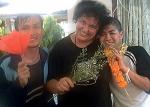The Unseen During The Olympics
Monday, August 18th, 2008Watching the Olympics in Beijing has got me to thinking about China again. I’d like to make a point about the legacy of the damage done in the last 50 years.
You might like to read “The Corpse Walker: Real-Life Stories, China from the Bottom Up” by Liao Yiwu.
Master Deng Kuan, abbot of the Gu Temple, established in the Sui Dynasty sometime around the turn of the sixth century, was 103 when the writer Liao Yiwu met him while mountain climbing in Sichuan Province, in 2003, and Yiwu’s oral histories begin with him.
This is from a review of the book by Howard W. French, a former career foreign correspondent for the New York Times, who covered China from 2003 to 2008 and who teaches at the Columbia University Graduate School of Journalism:
We know the Anti-Rightist Campaign of the late 1950s, the party went on a nationwide witch hunt for supposed liberals, reactionaries and capitalist roaders. Relating the Chinese experience amounts to a way of averting one’s eyes from something that may seem too hard to comprehend. It also encourages a kind of blurry forgetting, a storing away of things on a high, musty shelf that has been officially encouraged by China’s leaders, who are most keen to manage this story because they have the most to lose from a more vigorous and thorough telling. Thus the famous posthumous verdict by Deng Xiaoping, who judged that Mao had been 70 percent “correct” and 30 percent wrong. Yes, Mao’s errors, like the 30 million or more deaths from starvation caused by the crash industrialization of the Great Leap Forward, were doozies, but by and large he kept the country on the right path, avers Deng Xiaoping. Deng’s past has also benefited from studious airbrushing to avoid mussing up the standard portrait of him as a kindly, strong and nearly infallible second father to the nation. His enthusiastic role in violently suppressing “rightists” in the late 1950s has been placed out of bounds by the gatekeepers who determine which subjects can be researched and which cannot.
Master Deng’s life, and almost every other oral history in Liao Yiwu’s new book, appropriately subtitled Real-Life Stories, China From the Bottom Up , gives the lie to this entire vision, making this a deeply subversive book. I do not mean the reader should expect a tract or treatise on Chinese politics. Instead, Liao casts aside the official “facts” of events and replaces them with “memories”–with the resulting contrast between the censored record and interior consciousness revealing a post-1949 China that has never stopped being a traumatic place. At their root, all of Liao’s “real-life” stories share something fundamental: a fantastic, dreamy and nightmarish quality. Each story provokes a moment’s thought about its relationship to the truth.
[read on]

